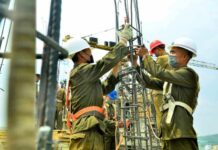Changchun, China — Discontent and citizens’ petitions caused by the recent Chosun (North Korea) Central TV series about Daehongdan in Yangkang Province are causing problems for the governing authorities.
A source from Yangkang Province said in a phone conversation with the Daily NK, “The television broadcast about Daehongdan has aggravated civilian sentiment. As a result, the Party in Pyongyang and the provincial party cadres have been getting on the case, causing a stir trying to understand the situation and form an appropriate response.”
The Central TV broadcasted the three-part special series from December 18 to 26 of last year called “Daehongdan citizens building Utopia in the Military-first period.” In this program, the following topics were specifically featured: ▲ the normalization of the bus service between Hyesan and Daehongdan; ▲ the construction of housing for civilians; ▲ Baisan Pig Stock Farm; and ▲ the medium-size Power Stations of Daehongdan.
This special program was produced to commemorate the 10th anniversary of the presentation of Kim Jong Il’s treatise, “Regarding the rise of a revolution in potato agriculture.”
The source said, “After the television programs were aired, older party members went to the party committee of the county and protested, ‘How can they tell such lies? Because the mid-level cadres are telling lies and deceiving the General, our country is in such a state. Since the broadcast, anonymous letters were sent and rumors started spreading across the country, prompting the Guidance Department’s provincial leadership officials as well as the provincial party secretary-in-charge and the propaganda secretary to descend on Daehongdan County and analyze the situation.”
The source put forward the opinion that the opposition of the local citizens who viewed the special broadcast stemmed primarily from the vast gap between the broadcast and reality.
For instance, the bus presently operating between Hyesan and Daehongdan is only once a day and it is almost impossible for average civilians to afford the bus fare of 12,000 North Korean won per person, which is extremely expensive.
Also, the “civilian housing” focused on by the broadcast is not newly-constructed, but reconstructed from the civilian apartments that were built along with the “No. 5 Power Station” in 1992.
Similarly, the source noted that the Baisan Pig Stock Farm which purportedly rears “several thousand pigs” only keeps about 100 at present, due to the high cost of fodder.
The source said, “The cadres have been doing the rounds of the places which were introduced in the program; the pig farm and the bus management office, and attempting to think of what to do. Also, engineers from the Construction Department have come down to the power station to discuss policies to sustain the medium-size generators.”
He added, “Officials of the Central Committee of the Party have also come forward to discuss normalizing the bus system. They promised to send two buses to Daehongdan and to reduce the fare to 5,000 won.”
The source also said, “Specific discussion among the Party cadres has been serious, but no conclusions have been drawn regarding the Baisan Pig Stock Farm. Without operating the potato production factory, there has been a lack of fodder for the pigs, making it difficult to raise them.”
He commented sadly, “Daehongdan’s utmost point of pride is the ‘potato production factory’ which came from Germany, but due to the suspension of production, it was not introduced in the broadcast.”
Finally, the source said that he had heard rumors of corn being brought to be used in the pig farm as fodder, but this remains to be seen.




















